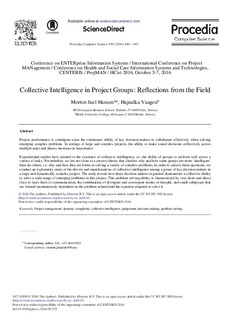| dc.contributor.author | Hansen, Morten Juel | |
| dc.contributor.author | Vaagen, Hajnalka | |
| dc.date.accessioned | 2017-06-29T14:41:40Z | |
| dc.date.available | 2017-06-29T14:41:40Z | |
| dc.date.created | 2016-12-13T12:26:27Z | |
| dc.date.issued | 2016 | |
| dc.identifier.citation | Procedia Computer Science. 2016, 100 840-847. | nb_NO |
| dc.identifier.issn | 1877-0509 | |
| dc.identifier.uri | http://hdl.handle.net/11250/2447398 | |
| dc.description.abstract | Project performance is contingent upon the continuous ability of key decision-makers to collaborate effectively when solving emerging complex problems. In settings of large and complex projects, the ability to make sound decisions collectively across multiple tasks and phases increases in importance.
Experimental studies have pointed to the existence of collective intelligence, i.e. the ability of groups to perform well across a variety of tasks. Nevertheless, we are not close to a process theory that clarifies why and how some groups are more ‘intelligent’ than are others, i.e. why and how they are better at solving a variety of complex problems. In order to answer these questions, we conduct an exploratory study of the drivers and manifestations of collective intelligence among a group of key decision makers in a large and dynamically complex project. The study reveals how these decision makers in general demonstrate a collective ability to solve a wide range of emerging problems in this project. This problem solving ability is characterized by very short and direct (face to face) lines of communication, the combination of divergent and convergent modes of thought, and small subgroups that are formed spontaneously dependent on the problem at hand and the expertise required to solve it.
Keywords
Project managementdynamic complexitycollective intelligencejudgementdecision-makingproblem solving | nb_NO |
| dc.language.iso | eng | nb_NO |
| dc.title | Collective Intelligence in Project Groups: Reflections from the Field | nb_NO |
| dc.type | Journal article | nb_NO |
| dc.type | Peer reviewed | nb_NO |
| dc.description.version | publishedVersion | nb_NO |
| dc.source.pagenumber | 840-847 | nb_NO |
| dc.source.volume | 100 | nb_NO |
| dc.source.journal | Procedia Computer Science | nb_NO |
| dc.identifier.doi | http://dx.doi.org/10.1016/j.procs.2016.09.233 | |
| dc.identifier.cristin | 1412068 | |
| dc.description.localcode | 1,OA | nb_NO |
| cristin.unitcode | 158,4,0,0 | |
| cristin.unitname | Institutt for ledelse og organisasjon | |
| cristin.ispublished | true | |
| cristin.fulltext | original | |
| cristin.qualitycode | 1 | |
